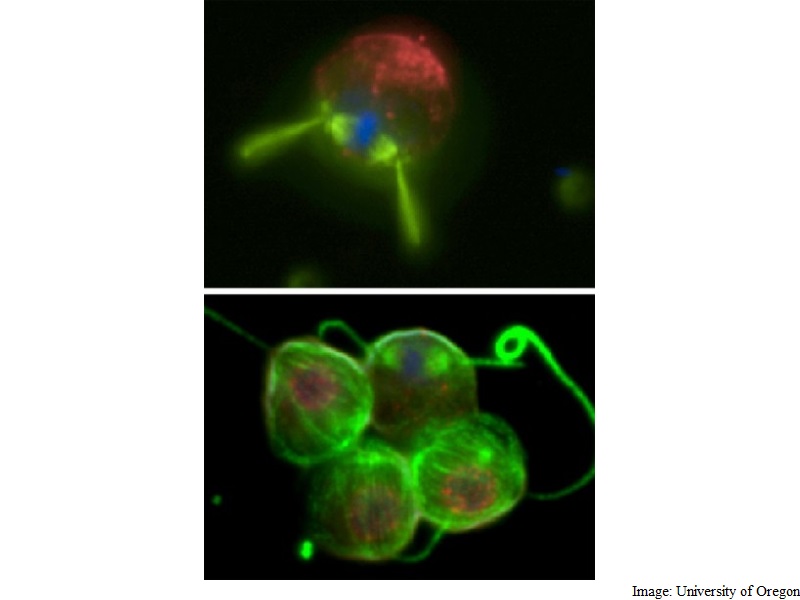- Home
- Science
- Science News
- One Random Mutation Triggered Life on Earth 600 Million Years Ago
One Random Mutation Triggered Life on Earth 600 Million Years Ago

With that random act, a new protein function was born that helped our single-celled ancestor transition into an organised multicellular organism.
Proteins are the workhorses of our cells, performing a wide variety of tasks such as metabolism.
"Our work suggests that new protein functions can evolve with a very small number of mutations. In this case, only one was required," said biochemist Ken Prehoda from University of Oregon.
This mutation is one small change that dramatically altered the protein's function, allowing it to perform a completely different task.
"You could say that animals really like these proteins because there are now over 70 of them inside of us," Prehoda added.
For the research, Prehoda's team looked at choanoflagellates which are a group of free-living, single-celled organisms considered to be the closest living relative of animals.
These sponge-like, seawater-dwelling organisms have a short, outward-facing squiggly tail called a flagellum that allows them to move and gather food.
Prehoda and colleagues then used ancestral protein reconstruction, a technique devised by co-author Joseph W Thornton, a biologist now at University of Chicago.
The team identified a mutation that was important for opening the door to organised multicellular animals that eventually no longer needed their tails.
They also found that the choanoflagellate flagellum is critical for organising its multi-cellular colony, suggesting that this may have also been the case as our single-celled ancestor transitioned to a multi-cellular lifestyle.
The protein domain that resulted from this mutation is found today in all animal genomes and their close unicellular relatives but absent in other life forms.
The research helps to address several important questions that scientists have had about evolution.
"It also has implications for studying diseases such as cancer in which damaged cells no longer cooperate with other cells in our bodies and revert back to a unicellular state where each is on its own," the authors noted in a paper appeared in the journal eLife.
Catch the latest from the Consumer Electronics Show on Gadgets 360, at our CES 2026 hub.
Related Stories
- Samsung Galaxy Unpacked 2025
- ChatGPT
- Redmi Note 14 Pro+
- iPhone 16
- Apple Vision Pro
- Oneplus 12
- OnePlus Nord CE 3 Lite 5G
- iPhone 13
- Xiaomi 14 Pro
- Oppo Find N3
- Tecno Spark Go (2023)
- Realme V30
- Best Phones Under 25000
- Samsung Galaxy S24 Series
- Cryptocurrency
- iQoo 12
- Samsung Galaxy S24 Ultra
- Giottus
- Samsung Galaxy Z Flip 5
- Apple 'Scary Fast'
- Housefull 5
- GoPro Hero 12 Black Review
- Invincible Season 2
- JioGlass
- HD Ready TV
- Laptop Under 50000
- Smartwatch Under 10000
- Latest Mobile Phones
- Compare Phones
- Tecno Spark Go 3
- iQOO Z11 Turbo
- OPPO A6c
- Samsung Galaxy A07 5G
- Vivo Y500i
- OnePlus Turbo 6V
- OnePlus Turbo 6
- Itel Zeno 20 Max
- Lenovo Yoga Slim 7x (2025)
- Lenovo Yoga Slim 7a
- Lenovo Idea Tab Plus
- Realme Pad 3
- Garmin Quatix 8 Pro
- NoiseFit Pro 6R
- Haier H5E Series
- Acerpure Nitro Z Series 100-inch QLED TV
- Asus ROG Ally
- Nintendo Switch Lite
- Haier 1.6 Ton 5 Star Inverter Split AC (HSU19G-MZAID5BN-INV)
- Haier 1.6 Ton 5 Star Inverter Split AC (HSU19G-MZAIM5BN-INV)

















